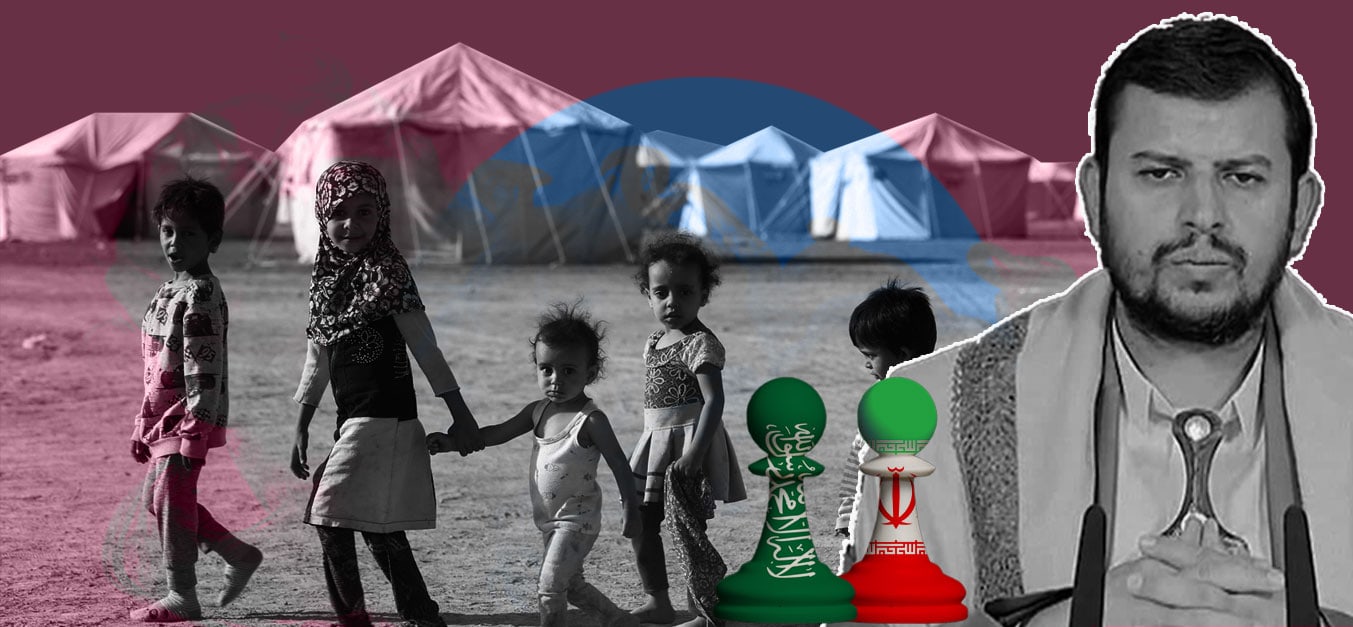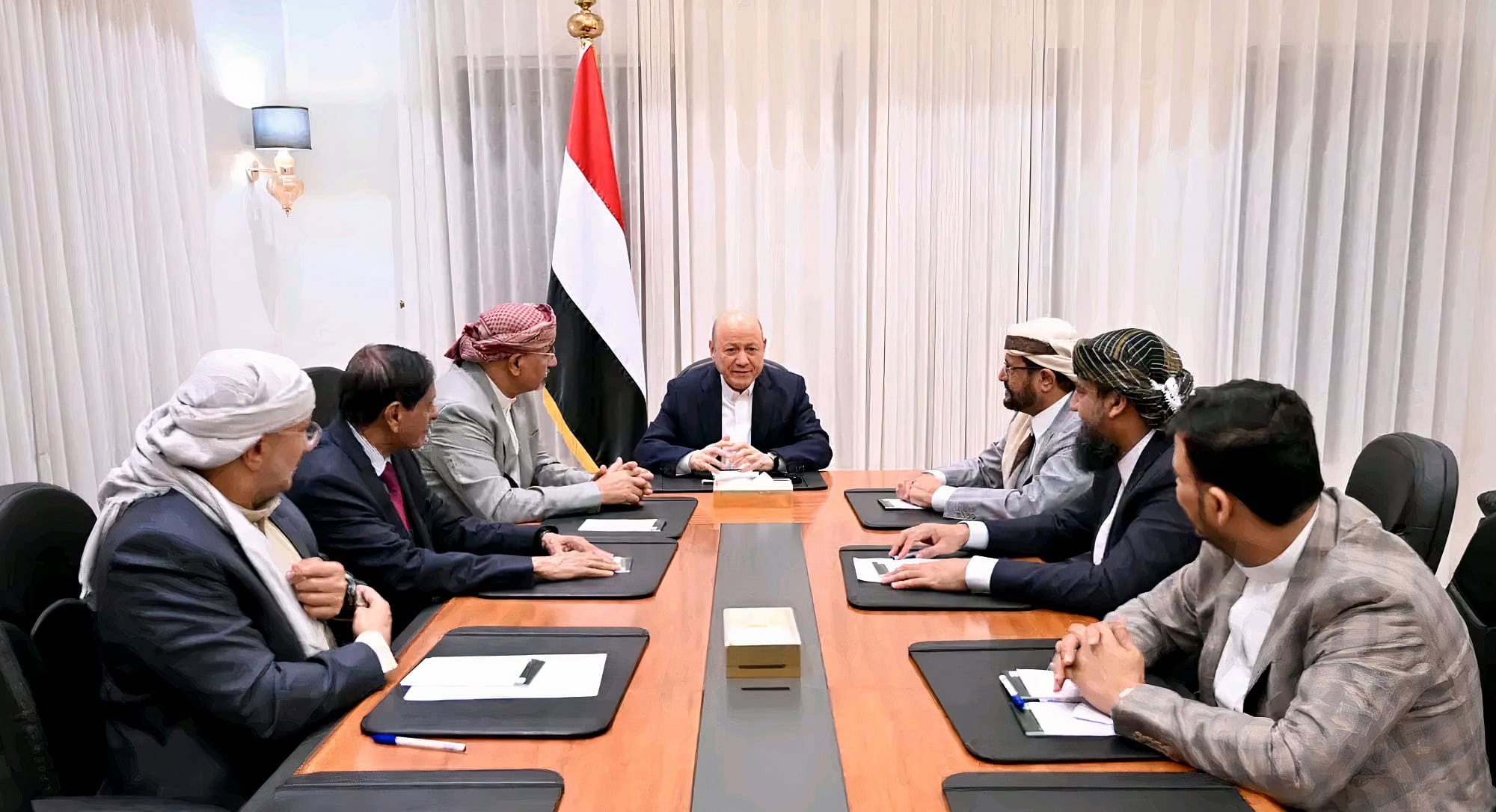
Designed by ’South24 Center’
آخر تحديث في: 15-08-2024 الساعة 1 مساءً بتوقيت عدن
The lack of political will among the parties that constitute the Yemeni Internationally-Recognized Government and their repeated surrender to international and regional pressure aggravates the crisis and makes a military solution the most probable scenario internally. This is amid the fluidity of the regional policies and the lack of an international vision.
Farida Ahmed (South24)
On July 23, a statement by the Office of the Special Envoy of the Secretary General of the UN For Yemen, Hans Grundberg, announced an agreement between the Internationally-Recognized Government and the Houthis to de-escalate tensions, in terms of the banking sector and Yemenia Airways. The agreement came a few weeks after the Internationally-Recognized Government issued punitive decisions imposed by the Central Bank of Yemen-Aden against the commercial banks violating the decision to move their main headquarters from Sanaa, which is controlled by the Houthis, to the capital, Aden, in South Yemen. Although the government’s decision was largely endorsed, it was quickly frozen by a sudden announcement from Grundberg’s Office. It is worth mentioning that the UN Envoy had previously asked the Internationally-Recognized Government and the Central Bank in Aden to postpone the punitive decisions till the end of August to avoid putting further pressure on the Yemeni economy. However, the sudden freeze highlights the scale of the massive pressure on the Internationally-Recognized Government by the UN Envoy, and Saudi Arabia priorly under the pretext of avoiding a military escalation by the Houthis against its territories.
Notably, the weeks before the announcement about backing down from the decisions had witnessed strong disputes within the Internationally-Recognized Government due to regional and international pressure for not tightening the noose on the Houthis, according to official sources who previously spoke with ’South24 Center‘. Backing off from the banking decisions by the Presidential Leadership Council (PLC) and the government has led to a massive wave of discontent among citizens. This has pushed the syndicates of employees of the Central Bank and the National Bank in Aden to organize a protest to voice their rejection of the government’s surrender to external pressure which serves the Houthi goals. The Central Bank’s firm measures were expected to be followed by similar moves in the communications sector from which the Houthis largely benefit as a main source to fund their military efforts and a basic tool in their propaganda and espionage activities. Senior military and security figures in South Yemen have been killed as a result of the failure to free the communications and internet sector from the Houthi grip.
The government’s strict economic measures would have seen the Houthi’s economic influence gradually reduced, along with the growing military pressure as a result of their expected losses, especially after the July 20 Israeli violent retaliatory attack on the Port of Al-Hodeidah on which the group relied heavily for its sources of income. This would have majorly hit the Houthis’ combat abilities. This reality, along with the UN’s inability and the Saudi concessions in the face of the growing Houthi demands, have encouraged the group to commit further violations day after day.
It is important to indicate that the Saudi’s implicit recognition of the Houthis as negotiators has emboldened them to demand more concessions. This even went to the extent of them threatening to hit Saudi strategic targets. Despite Riyadh’s attempts to play the mediation role, the Houthis still consider Saudi Arabia a main war party. This constitutes a big challenge to the kingdom, especially on its Southern borders. However, this is considered a bigger challenge for the Internationally-Recognized Government, especially in case the Saudis and the Houthis arrive at restricted security agreements that would exclude the government. This would only enhance the Houthi's capabilities and push them to continue their hostile activities in the region.
Despite the Southern Transitional Council (STC) warnings about the dire economic and political repercussions of suspending the Central Bank of Yemen-Aden’s decisions, the CBY was forced under UN and Saudi pressure to reverse its stance, similar to what happened with the other components with regard to the Internationally-Recognized Government. This repeated response to pressure threatens undermining the status of the STC’s popularity and stirs concerns regarding the continuation of the concessions approach in the future, including the special framework of the South issue, and to be included on the negotiation table in the first phase of any political process.
Hadramout in the Forefront
The visit by the PLC Chairman, Rashad Al-Alimi, to Hadramout on July 27 was met with much popular protests in the Hadrami streets. This is especially related to the fact that the visit came directly after the government announced backing off from the economic decisions. This points to an imminent resumption of oil exports from the Port of Al-Dabba in Hadramout. In this regard, a statement by the Hadramout Tribal Alliance, also known as the Hadramout Tribes Confederacy, warned about making any decisions related to the governorate’s oil or exporting or marketing it before enhancing the status of Hadramout and ensuring its rights. The Hadrami tribes are worried about pushing the UN roadmap that gives the Houthis a share from the governorate’s oil, in response to Saudi pressure. Moreover, Hadramis have also expressed their discontent regarding the deterioration of public services. This has pushed them to threaten to use weapons and also indicated their readiness to carry out bigger escalation steps, especially after the expiration of the 30-day deadline they set for the Internationally-Recognized Government from July 13 to implement their demands regarding betterment of services and economic conditions.
The matter of resuming oil exports from Hadramout is apparently more urgent than ever, whether for the Internationally Recognized Government or the Houthis. This is particularly related to the fact that the activities in the Houthi-held Port of Al-Hodeidah have ceased due to the Israeli air strikes. This situation constitutes a big challenge for the government in the coming period, as on one hand it is faced with the protesting Hadrami tribes, and on the other it has to contend with the Saudi pressure to drive the wheels of the Houthi economy, especially if the latter are forced to demand oil supplies to avoid a choking fuel crisis in their controlled areas after the massive damage to the Port of Hodeidah. The Internationally-Recognized Government could have benefited from the Houthi troubles by a political and economic maneuver. However, the government has failed in its first test.
Currently, the Houthis will be committed to de-escalation in return for freezing of the banking decisions. If they decide to escalate, the government will be free from any obligations toward the group. Thus, it can improve its negotiation status by resuming the economic decisions against the Houthis again. This is along with responding to the Hadrami demands that is getting stronger by the day for enabling the Hadrami people to enjoy their rights and benefit from the revenues of their oil wealth which constitutes about 70% of the country’s national income.
Tense Regional Scene
The Yemeni file can’t be separated from the main drivers of the escalating regional scene. The Houthi alliance with the so-called “the axis of resistance”, led by Tehran, makes the group ready for escalation at any given moment. The Iranian threat to take revenge on Israel is raising the risk degree, especially after the latest assassinations -- in Lebanon of Hezbollah military commander Fuad Shukr on July 30, and Iran of Chairman of Hamas’ Political Bureau, Ismail Haniyeh on July 31. These developments may postpone any Yemeni discussions regarding political or economic issues in the coming period until the regional vision becomes clear regarding the expected military and security concerns in the region. After 10 months of the war in Gaza, the United States is apparently far away from reaching a ceasefire agreement with Israel. According to statements by its Secretary of the State Antony Blinken, the United States is “ready for all possibilities”. There are no regional and international efforts to support Palestinians which further complicates the scene.
These indications have pushed Washington to resume the sale of offensive weapons to Saudi Arabia after a ban that lasted more than three years. This move apparently serves as an American test of the limits of the Saudi military moves on the Yemeni file with regard to the Houthis. This comes amid ongoing Saudi pressure to ease the ban in order to protect the kingdom’s southern borders in case of a possible Houthi escalation. The Houthis recently announced their intention to establish a new de-facto government in Sanaa (This article was written before the Houthis actually announced the establishment of a government). Despite efforts by Riyadh and Muscat to push forward a roadmap to defuse the Yemeni file, it is important to link this with the estimates regarding the current developments and the consequences of the expected Israeli-Iranian confrontation on Yemen.
It is important to indicate that despite the Houthi de-escalation commitment regarding the Yemeni issue in return for freezing the governmental economic measures, they are ready at any given moment to engage in an expanded war, in cooperation with Iran, especially after Israel targeted one of their most important funding sources in the Port of Al-Hodeidah. The shape the military confrontation between Israel and Iran will take is still unknown, whether it will be a direct one or an indirect one by using Tehran’s proxies in the region. It is still unknown if the confrontation will include carrying out qualitative operations that will hit the Israeli depth and target Israeli leaders or if we will see a repetition of the April scenario that was described by many observers as more like a play*. Such a scenario may further harm Tehran’s image in the world and destabilize the Iranian peoples’ trust in the regime. This may encourage the Iranian people to rebel against the regime in light of the internal challenges and the reported divisions between the elected Iranian President Masoud Pezeshkian and the leadership of the Iranian Revolutionary Guard Corps.
Accordingly, the Yemeni file, including the economic side, will be linked to the nature of the escalating developments in the region. Any solution to the Yemeni crisis will have to take into consideration the complicated regional factors. Furthermore, the lack of political will among the parties that constitute the Yemeni Internationally-Recognized Government and their repeated surrender to international and regional pressure aggravates the crisis and makes a military solution the most probable scenario internally. This is amid the fluidity of the regional policies and the lack of an international vision to deal with the Iran-backed Yemeni group.
(*On April 1, an Israeli airstrike on the Iranian consulate in Damascus killed seven Islamic Revolutionary Guard Corps commanders, including two generals. Two weeks later, Iran retaliated with a barrage of drones and missiles, almost all of which were intercepted. Israel responded with its own drone and missile attack on an airbase in Iran. The exchange brought the shadow war the two countries have been fighting for more than a decade into the open).

قبل 3 أشهر